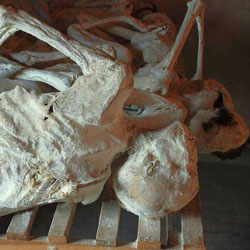Are we all equal in the media? That's the question to ask as we mark 20 years since the Rwandan genocide.
Those terrible events showed both how powerful the media are and how ineffective they can be. On a local scale, Rwandan newspapers and radio stations were horribly successful in promoting the killings. Radio played a central role, using the traditional propagandists' tools of lies, rumours and exaggerations mixed with popular music and interactive chat, to create the conditions for genocide, to define who were victims and who were legitimate targets, who had voice and who were silenced.
On a global scale, what was most striking was the failure of the media to get the world to take notice. Of course, the world's inability to intervene in Rwanda cannot be blamed on the media, as the reasons were complex. But it does raise important questions about what role the media can play in preventing such tragedies.
It was genocide, so call it genocide

Mass Grave Memorial in Southern Rwanda, near Bukavu, commemorates the Genocide of 1994. (Image:
Sascha Grabow, via Wikimedia Commons)
One of the lessons learnt is to call a genocide by its name. There were some who were cautious about throwing around this weighty word, often used in exaggeration, but there were others who deliberately avoided it. Released official documents have suggested that US officials were instructed to avoid using the word genocide because of the obligations it would impose on them to act. They were not alone in this. Instead, international agencies and cautious diplomats talked of "chaos", "confusion", "anarchy" and "calamitous circumstances", as if it were a natural disaster. (At home, we are debating the difference between theft and improper benefit.)
It was all too easy to fall back on stereotypes and simplistic explanations, which had the effect of disguising what was happening. To quote Human Rights Watch: "Some policy makers could not get beyond the old clichés, like one official of the US National Security Council, who described the genocide as 'tribal killings'. In a similar vein, an adviser to then French president Francois Mitterrand suggested that brutal slaughter was a usual practice among Africans and could not be easily eradicated.
"Other diplomats, more up to date, promoted the idea of a 'failed state', ignoring all indications that the Rwandan state was all too successful in doing what its leaders intended... Most journalists simply exploited the horror and made no effort to go beyond the easy explanations."
They achieved nothing
Annie Thomas from French news agency AFP wrote this week with searing honesty about the horrors she witnessed and reported on bravely: "What purpose did all those articles serve? Nothing, I fear, except, perhaps, to assuage the guilt that I still feel now for not walking up to the murderous troops at the hospital and shouting at them to stop; for not allowing young people running from the militia to climb in our car; for having been given a hearty welcome because I'm French, by killers whose machetes were still dripping with blood; for failing to write from the start that we were witnessing a genocide, not just 'interethnic strife'."
Thomas was one of the few foreign correspondents who did not flee. Journalist Edgar Roski wrote later of "un genocide sans images", genocide without images, raising the issue of what might have happened if we had more pictures of the horror.
Would it be different now?
Would it be different now, with 24/7 live news channels and instant global social media to carry the story to the world? Do these new tools make it harder for the world to be indifferent? I am not so sure, because it wasn't the technology that relegated the story to inside pages in most newspapers. If the few journalists who stuck with the story had access to blogs and social media, would we have noticed it amid all the clamour? In the age of the ubiquitous cellphone, would we ever be sans images?
The cruel reality is that some people are seen and heard in the world's media and others less so. When a cry of pain comes from one of our troubled townships or from striking mineworkers, is it heard above the screams of Oscar Pistorius or Reeva Steenkamp, which are amplified around the world? One thing is for sure, the Pistorius trial is not sans images.




















































